The recent collaboration between Apple and OpenAI has sparked a significant privacy debate, primarily fueled by insights and concerns raised by tech mogul Elon Musk. This partnership aims to enhance the capabilities of AI systems by incorporating advanced algorithms and diverse data sets. While the potential benefits of such a collaboration are substantial, it also raises critical questions regarding data privacy, security, and ethical considerations.
One of the primary concerns surrounding the Apple-OpenAI partnership is the privacy of user data. With access to a vast amount of data gathered from Apple’s devices and services, the collaboration has the potential to significantly improve the performance of AI systems. However, this access also raises questions about how this data will be used and whether user privacy will be adequately protected.
Elon Musk has been vocal about his concerns regarding AI and privacy, highlighting the importance of safeguarding user data in the age of advanced artificial intelligence. Musk’s warnings about the potential dangers of unregulated AI development have drawn attention to the need for comprehensive regulations and ethical guidelines to govern AI technologies effectively.
The debate surrounding the Apple-OpenAI partnership underscores the broader issue of data privacy in the digital age. As companies continue to collect and analyze vast amounts of user data, ensuring the protection and security of this data becomes increasingly crucial. Questions about how data is collected, stored, and shared must be addressed to prevent potential privacy breaches and misuse of personal information.
The collaboration between Apple and OpenAI represents a significant step forward in the development of advanced AI technologies. However, it also serves as a reminder of the importance of maintaining a balance between technological progress and protecting user privacy. As AI continues to shape various aspects of our lives, it is imperative that we establish robust privacy regulations and ethical standards to guide its responsible development and deployment. The privacy debate sparked by this partnership serves as a critical reminder of the need to prioritize user privacy and security in the era of advanced artificial intelligence.
